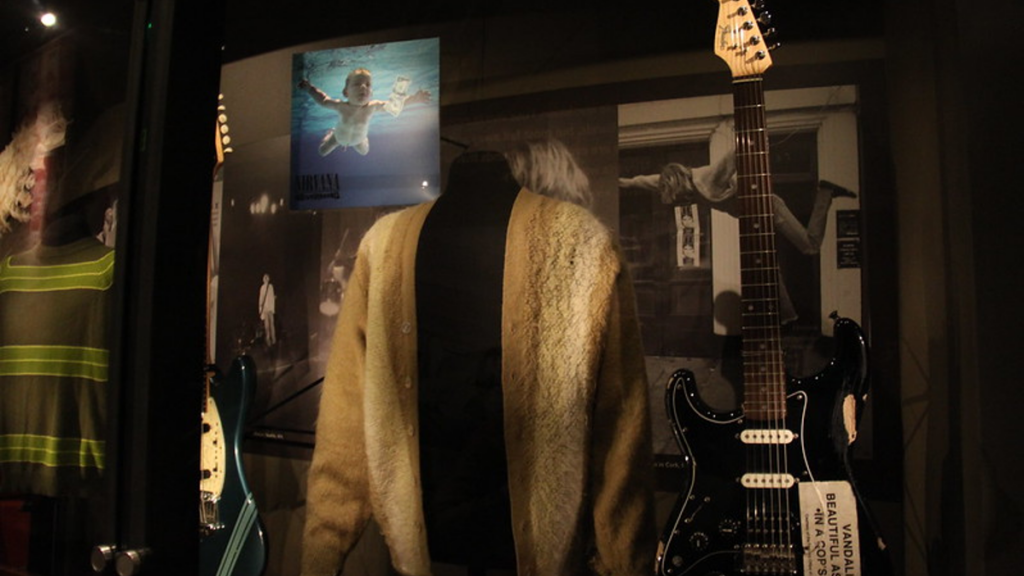Is Nirvana’s ‘Nevermind’ Album Cover Child Pornography? US Appeals Court Revives Case


Photo Credit: Theresa Arzadon-Labajo / CC by 2.0
Despite a lower court ruling that the statute of limitations had passed on Spencer Elden’s child pornography lawsuit against Nirvana, a federal appeals court revives the case.
On Thursday, December 21, the US Court of Appeals for the Ninth Circuit ruled against Nirvana, reviving a child pornography lawsuit filed by Spencer Elden, the man who appeared as a naked baby on the cover of the band’s 1991 album, Nevermind. Last year, a lower court ruled that Elden waited too long to sue, and the statute of limitations had passed — but now the federal appeals court’s decision overturns that ruling.
Elden, now in his 30s, claims that the photo violated federal child pornography laws by depicting a sexualized image of a minor. While the lower court ruled that he had waited far too long to sue, the federal court’s overturning decision ruled that each republication of the image — such as the 30th anniversary re-release of Nevermind in 2021 — might constitute a new “injury” to Elden, resetting the statute of limitations.
“Victims of child pornography may suffer a new injury upon the republication of the pornographic material,” wrote Judge Sandra Segal Ikuta. “This conclusion is consistent with the Supreme Court’s view that every viewing of child pornography is a repetition of the victim’s abuse.
The lawsuit will return to a lower court, where Elden’s claims that the image meets the definition of child pornography must be proven — something vehemently disputed by Nirvana and their legal team. The band’s attorney Bert Deixler called the case “meritless” and the ruling a “procedural setback” that doesn’t affect his team’s arguments.
Meanwhile, Robert Lewis, lead counsel for Spencer Elden, reports that his client is “very pleased with the decision and looks forward to having his day in court.”
“The decision is important for all child pornography victims,” said Lewis.
“Spencer’s true identity and legal name are forever tied to the commercial sexual exploitation he experienced as a minor, which has been distributed and sold worldwide from the time he was a baby to the present day,” claimed Elden’s initial 2021 civil lawsuit.
The lawsuit names Nirvana’s corporate entity, Kurt Cobain’s estate, Dave Grohl, Universal Music Group, and several other individuals and companies. Notably, because the lawsuit is a civil action, no allegations of criminal wrongdoing by any parties have been raised.
Link to the source article – https://www.digitalmusicnews.com/2023/12/21/nirvana-nevermind-child-pornography/
Recommended for you
-
60 Pieces Drum Gel Drum Dampeners Pads Silicone Drum Silencers Soft Drum Dampening Gel Pads Drums Soft Drum Dampeners for Drums Cymbals Tone Control
$8,89 Buy From Amazon -
26 inch Caramel CT904 Ebony Tenor LCD color display Electric Professional Player Beginners Ukulele Uke Kit Bundle Padded Gig bag Strings,Strap
$99,99 Buy From Amazon -
Laminated Ukulele Fretboard Notes & Easy Beginner Chord Chart 11″x17″ Instructional Poster for Soprano Concert Tenor Uke by A New Song Music
$15,99 Buy From Amazon -
Mellbree MIDI Cable, 2-Pack 3-Feet Male to Male 5-Pin MIDI Cable Compatible with MIDI Keyboard, Keyboard Synth, Rack Synth, Sampler, External Sound Card, Sound Source and Other Music Gear
$9,99 Buy From Amazon -
ROCKSOCKI Electronic Drum Set 9Pads with LED Lights, Bluetooth Portable Electronic Drum Kit, Roll-Up Practice Drum Pad, Built-in Dual Speakers, Headphone, Holiday Birthday Gift for Kids
$69,99 Buy From Amazon -
Shinco Handheld Mic, Cardioid Vocal Dynamic Microphone with 13ft Cable and ON/Off Switch, Plug-in Microphone for Karaoke Singing Machine, AMP, and Speaker
$9,99 Buy From Amazon -
CB SKY 5-piece Kids/Junior Drum Set 13″ bass drum/Beginner (Standard) /Kids musical toys, musical instrument for ages 3-5 5-9
$84,99 Buy From Amazon -
Broadway Gift Natural Wood Bass Electric Guitar with Case and Stand Replica Figurine 7 Inch
$29,99 Buy From Amazon













Responses